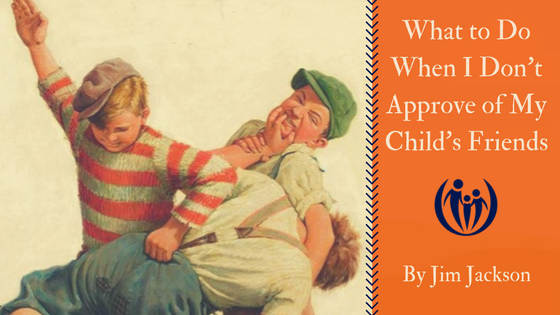
What to Do When I Don’t Approve of My Child’s Friends

Peer relationships carry increasing influence as children grow up. And sometimes, these relationships can be reason for parents to feel increasingly anxious.
Kids may choose good friends or they may not. Parents, wanting what’s best for their kids, have a tendency to over-control their children’s choices. I was one of those.
As Daniel entered elementary school, he had a friend Lynne and I did not particularly care for. Because they shared common interests, they gravitated toward each other. The fact that the friend was in our neighborhood also made it almost impossible to fully monitor their interaction. We tried to convince Daniel that while this friend needed God’s love, we didn’t think their friendship was a good idea. But even as a seven-year-old, he was resistant to our control.
We had two choices: step in and assert our control, or step back and focus on guiding Daniel.
Parents often ask, “If it seems to be in their best interest for me to control their friendships, why is that a bad thing?” I answer by asking, “How do you feel when someone controls you, even if they believe it’s in your best interest?” Most of the time, they answer by saying, “I feel resentful, misunderstood, or deflated.”
When people of any age are controlled, they are also disempowered. Certainly, if a five year old is about to run in front of a car on the street, I will “control” him by yelling or grabbing him. So there may be isolated cases when immediate control of a child is truly necessary for his safety. But most situations do not demand such quick, full control. The question that really is best addressed here is: What is truly in their best interest – to be controlled for the near-term, or to be empowered for the long-term?
There are practical ways to guide children to learn to make wise choices in their friendships without controlling them. Here are two.
Build values early
When children experience deeply connected relationships, respectful conflict resolution, and solid teaching about values at home, they usually find disrespectful relationships unfamiliar and unappealing. As children grow older their selection of friends becomes more clearly an expression of their values.
This is why it is so important to begin the teaching and influence about my children’s friends early in their lives. The challenge can be much more difficult when parents wait. Young children are so much more receptive to parents’ influence, while teenagers will likely interpret discussions about friendships as an attempt to control them. The older my children are, the more it is likely that control of their friendships will backfire and drive them to the very friends I wish they would avoid.
Express relaxed curiosity
When my children hang out with kids I don’t know or understand, I try to express interest without a judgmental attitude. (Of course, I can do this only if I am sincerely interested rather than judgmental – this is Foundation work.) This approach often provides an opportunity for me to learn about how my children evaluate their friendships. I begin with questions such as, “Tell me about your friend. I’d like to get to know him/her better.” “How is your friend similar to you? How is he/she different?” “What do you like about your friendship?” “What’s important to you in friendships?” “Is there anything you’re concerned about with this friendship?”
The goal of these questions is simply to listen and affirm! This helps my kids to see me as a resource to their friendships. They will much more likely share their concerns and ask about my perspective. Even if they don’t ask for my perspective, the described process gives me a respected place from which to eventually share it.
When we engage our kids from a place of true curiosity, without judgment, and helping them to learn and enjoy what truly healthy relationships are like, then kids’ hearts will be more open to choose their friends thoughtfully — and maybe even hear a little of our input on the subject.
This post is an excerpt from our book, How to Grow a Connected Family.
Sign up below to receive a weekly dose of encouragement straight to your inbox:

